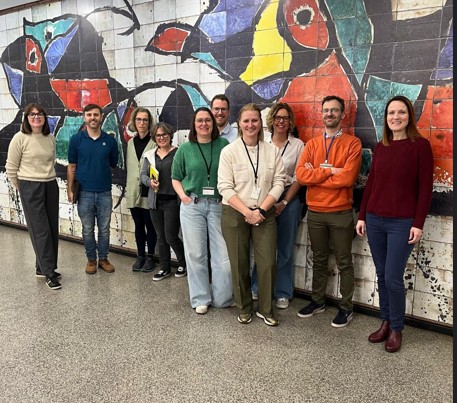Mobility Matchmaking Exchange in Catalonia: Innovation in VET education and dual training system
25/03/2025

In early February, Catalonia’s Regional Ministry of Education and VET hosted a delegation of teachers from Scholengroep Gent (GO! Education of the Flemish Community) as part of EARLALL’s Mobility Matchmaking exchange. The focus of the exchange was on innovation in Vocational Education and Training (VET) and dual training, areas in which Catalonia has established itself as a leader.
This exchange was part of EARLALL’s newly developed Mobility Matchmaking Tool, an initiative to promote capacity building and facilitate knowledge sharing among members. The tool provides a platform for in-depth discussions and exchanges on specific lifelong learning policies and practices, offering opportunities for study visits, job shadowing, and blended exchanges (virtual workshops followed by in-person visits). By bringing together professionals from different regions, the initiative helps foster the cross-border learning that is essential for strengthening VET systems across Europe.
The Belgian delegation’s visit to Catalonia was organised under the Erasmus+ mobility programme, to explore Catalonia’s dual learning system. Over the course of three days, the group visited several institutions and businesses that are spearheading dual learning and VET in the region. The visits provided concrete examples of how education and the workplace can work together to ensure students are equipped with the right skills to succeed in the job market.
The first stop was Institut de Logística de Barcelona, where the delegation explored an innovative educational model that places hands-on learning at its core. The institute focuses not only on academic knowledge but also on providing students with practical skills and real-world experience. What stood out during the visit was the institute’s commitment to connecting students with the right employers. This tailored approach ensures that students are well-prepared for the workforce and have clear career pathways.
Next, the group visited AGBAR, one of the region’s leading private water companies, which offers excellent dual programmes. AGBAR is committed to quality STEM-focused education and is a prime example of how businesses can directly shape the future workforce. The company’s collaboration with educational institutions to offer students real-world experience serves as a powerful model for bridging the gap between education and employment.
The group also had the chance to visit Institut ISMB, which focuses on dual training in mobility and transport. This visit further reinforced the idea that the region is dedicated to connecting students with industry and ensuring that they acquire the skills needed to meet the ever-changing demands of the labour market.
The peer learning exchange was not just beneficial for the Belgian delegation, but also for the Catalan hosts. Anna Cabedo Cubertorer from Catalonia’s Regional Ministry of Education and VET noted the mutual benefits, stating, “It was fantastic to welcome our Belgian colleagues and share with them how the Dual Training system works in Catalonia. These exchanges allow us to reflect on our practices and also bring fresh ideas from abroad, enriching our approach to vocational education.”
Feedback from the Belgian delegation echoed this sentiment. Kjel Vanhonacker from GO! Education of the Flemish Community described the visit as “an inspiring experience that provided valuable perspectives on dual learning and work-based education. The coordination structures and digital tracking platform for student progress were highlights of our exchange, showcasing an integrated approach that could serve as inspiration for our VET system.”
The exchange also highlighted the growing importance of international mobility for both students and teachers. Anna Cabedo pointed out the potential for future collaborations, especially in the area of mobility, which can open up exciting opportunities for students and educators to gain new insights and expand their professional networks.
The Erasmus+ mobility programme continues to be a vital platform for fostering international exchange and peer learning, which strengthens vocational education systems across Europe. Through the sharing of best practices, participating institutions and businesses are helping to build a more flexible, responsive, and inclusive VET landscape.
As both regions reflect on the success of this exchange, the potential for future collaborations remains high. This visit has not only provided tangible examples of how businesses and educational institutions can collaborate effectively, but it has also opened the door to new partnerships and opportunities for the future.
This exchange was part of the Pact for Skills Regional Skills Partnership on Lifelong Learning Mobility, which includes regions like Västra Götaland (Sweden), Movetia (Switzerland), and Catalonia, as well as key stakeholders like Camilla Winter AB (Sweden). These partnerships are essential in fostering regional cooperation, promoting equity, and empowering individuals through lifelong learning. By continuing to share knowledge and best practices, these regions are laying the groundwork for a more inclusive and sustainable future in education and vocational training.
The success of this event reinforces the importance of international collaboration in advancing lifelong learning and gender equality, further highlighting the role of the EARLALL network in facilitating such exchanges. As these collaborations continue to grow, so too will the opportunities for students to access high-quality, hands-on education that prepares them for success in an ever-changing job market.




